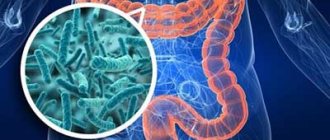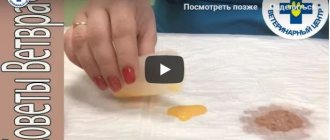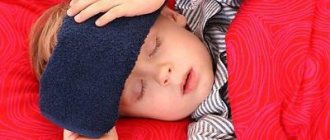Author of the article: Tironova Inna Igorevna
Gastroenterologist, therapist
15 years of experience
Professional skills: Colon hydrotherapy, treatment of gastrointestinal diseases
[adsp-pro-1]
Diarrhea is a physiological phenomenon; its purpose is to quickly remove substances from the intestines that the immune system perceives as potentially dangerous. Peristalsis increases, the colon does not have time to absorb excess water, so the stool becomes liquid. A few hours after emptying the gastrointestinal tract, a person’s well-being is restored. But at the same time, diarrhea is included in the clinical picture of many diseases that do not go away on their own, but require treatment. Chills and diarrhea are a combination of symptoms that can indicate a dangerous pathology.
Treatment of diarrhea, fever, weakness and headache
When a patient develops weakness, a temperature of 37-38, headache and diarrhea at the same time, food poisoning can be suspected, but doctors must conduct blood cultures, loose stools and vomit to confirm the diagnosis and develop a treatment strategy. This analysis helps to identify the causative agent of the disease. If a viral etiology is suspected, a rapid blood test is performed. It should reveal the nature of the infection.
In any case, the patient’s relatives should immediately call an ambulance if fever, weakness and diarrhea, as well as symptoms of dehydration appear, and while it is on its way, carry out a number of emergency measures. What can be done:
- Perform gastric lavage. To do this, you need to prepare a solution of potassium permanganate or soda. Drinking large amounts of water causes a person to vomit. In case of food poisoning, it is necessary to perform gastric lavage until the vomit becomes “clean” (without admixture of food residues).
- After gastric lavage, it is useful to give the patient any of the absorbents (Smecta, activated carbon). In order for the absorbent to dissolve faster in the stomach, it is necessary to take the medicine with plenty of water when taking it. This will quickly stop the diarrhea.
- If loose stools are frequent and accompanied by vomiting, as well as severe weakness, it is necessary to prevent the appearance of signs of dehydration. To do this, the patient is given a sip of a special solution every 10 minutes (one sachet of Regidron dissolved in a liter of water).
- It is impossible to reduce the temperature, even if it does not rise above 37 degrees. You should not take medications for diarrhea. The hidden clinic is the worst ally for making a diagnosis.
- While the ambulance is traveling, there is no need to give the patient food; it is better to ensure his complete rest.
It is impossible to take the initiative and self-medicate in such a situation. In case of food poisoning, it is strictly prohibited to give any antibiotics, sulfa drugs, or anti-diarrhea tablets to relieve high fever and headache, eliminate weakness and diarrhea. You cannot treat the described symptoms with decoctions and tinctures prepared according to traditional medicine recipes; you cannot rub the patient at a temperature (up to 38 degrees and above) with alcohol.
As a rule, if food poisoning is suspected, the patient is taken to the hospital, where all diagnostic measures are carried out and measures are taken to eliminate toxins, or the identified viruses are combated. If treatment is undertaken on time, if the source of poisoning can be identified, within three days the patient will feel much better, weakness disappears, appetite returns, body temperature stabilizes, and diarrhea disappears. After seven days, the patient (in the absence of characteristic symptoms) will be sent home with detailed recommendations for following a therapeutic diet.
Actions
You can get rid of the unpleasant symptoms of any type of poisoning yourself; for this it is important to know what to do and what is strictly not recommended to do. There is no targeted treatment for the treatment of chills itself, but the patient’s condition can be alleviated using improvised methods:
- A person’s limbs need to be insulated as much as possible - heating pads with warm water and warm blankets will help here.
- The patient must be provided with maximum comfort and complete rest.
- To reduce vascular spasms, you can use antispasmodics.
Note! If the patient is in a state of chills, which is accompanied by trembling, it will be quite difficult to get rid of the elevated temperature. At the same time, you should not be alarmed by the absence of a decrease in temperature after taking medications - this is a completely normal phenomenon.
It is necessary to take additional medications to alleviate the condition of the victim only after detailed consultation with a specialist. In case of food or drug poisoning, any medicine causes a huge blow to the body.
Causes of the condition
The main causes of diarrhea with fever can be of various natures, namely:
- intestinal infection (infection with bacteria, viruses or pathogenic fungi);
- poisoning with poor quality food, medications;
- intoxication in various diseases of internal organs;
- pregnancy;
- radiation exposure;
- drug overdose;
- gastrointestinal diseases.
Diarrhea accompanied by a rise in temperature is a condition that requires rapid resolution. With prolonged or rapid loss of fluid, a threat to the health and life of the patient may arise, especially in childhood.
About chills
The chills that occur in people during intoxication are directly related to spasms of blood vessels, which are found in abundant quantities in human skin. In this case, a certain trembling, discomfort in the muscles, and a feeling of incredible cold may be felt.
In most cases, the cause of the development of such a symptom is an increase in body temperature - the body quickly reacts to all changes and shows its reaction in all ways available to it.
It is worth paying attention to the fact that the cause of chills can be not only poisoning, but also other, no less unpleasant diseases, including:
- Hypertension leading to hypertensive crisis or stroke.
- Malaria, which often affects tourists.
- Disturbances of the hormonal system.
- Diabetes.
- Serious poisoning accompanied by increased body temperature.
Note! If the chills are caused not by poisoning of the body, but by one of the listed diseases, in no case should you engage in self-treatment. It is also important to consider that the presence of a disease does not exclude possible poisoning from food, chemicals or drugs.
When to call an ambulance
There are conditions for which home treatment is not appropriate. For diarrhea accompanied by high fever, emergency treatment to the hospital is required if:
- the skin became dry and pale;
- the patient is tormented by severe thirst, drinking liquid does not bring relief;
- cracks suddenly appeared on the lips;
- the amount of urine decreased and it became darker in color;
- the appearance of arrhythmia, tachycardia or pain in the heart.
Before the ambulance arrives, you should begin providing first aid to the patient yourself:
- the first thing required is to replenish lost fluid. You should drink plenty of clean water, chamomile decoction or special saline solutions that normalize the body's homeostasis (Regidron);
Important. In case of severe diarrhea occurring against the background of hyperthermia, drinking tea, coffee, juices, and alcohol is strictly prohibited.
How to properly care for a patient?
A patient weakened by nausea, vomiting, and diarrhea needs proper care. What to do to make him recover faster:
1 ensure that the patient is in a well-ventilated area;
2 at high temperatures, you need to periodically wipe his body with a damp towel;
3 after an attack of vomiting, it is advisable for the patient to rinse the mouth with water and lemon or mint infusion;
4 provide the patient with replenishment of lost fluid; he needs to drink more often, but in small portions;
5 when the vomiting subsides, if there is an appetite, the patient should be given low-fat broth with crackers;
6 During the recovery period, you need to gradually introduce foods with proteins and minerals into your diet so that strength is restored faster (low-fat meat and fish, cereals, green vegetables).
Intestinal infections are the main cause of diarrhea due to hyperthermia
The most common cause of diarrhea and temperature above 37 in adults and children are infectious diseases of a bacterial and viral nature. Less commonly, infection with pathogenic fungi leads to ACI.
Escherichia coli
The disease can be transmitted from infected people through food and water. Most often, infection occurs when consuming: meat, fish, dairy products, fruits, and vegetables. The disease is manifested by the following symptoms:
- loose stools, sometimes with blood;
- abdominal pain;
- nausea and vomiting;
- hyperthermia (up to 38-39 0 C).
Salmonellosis, dysentery
The disease is acute, expressed by severe green diarrhea; in severe cases, streaks of blood are detected, a pronounced rise in temperature (40 degrees) cannot be corrected with antipyretic drugs. The infection poses a threat to others. Requires inpatient treatment in the infectious diseases department.
Associated symptoms
Nausea and fever may be accompanied by the following symptoms:
Headache due to the fact that during poisoning, toxins entering the digestion have a negative systemic effect. Deterioration in general health, characterized by weakness, dizziness, and pale skin. Dehydration. Manifested by rapid breathing, decreased frequency of urination, and dry lips. Cutting and pressing pain in the abdomen. It is caused by spasms of the muscles of the intestines and stomach. Vomit. In moderate and severe forms of poisoning and infectious lesions, the body gets rid of toxins not only through feces, but also through vomit. Nausea is also caused by general disorders of the digestive system. With allergic diarrhea, a rash, Quincke's edema and other external signs of a negative reaction to the allergen may appear. An increase in temperature is accompanied by chills and sweating.
In the course of correlating symptoms, differential diagnosis is carried out.
It allows you to determine the exact cause of the ailment and develop a course of treatment that corresponds to it.
Analysis of the structure of feces is of great importance. For example, with diarrhea, the stool is watery with a yellowish tint, with hepatitis it turns white, with pancreatitis it contains food particles. More detailed information about the nature of the disease is provided by microbiological tests of stool for hepatitis and intestinal infections.
Additionally, the following diagnostic measures are taken:
Ultrasound of the pancreas and gallbladder. Biochemical blood test for enzymes. Blood test for antibodies to infections.
Rotavirus infection
Children and people with weakened immune systems are most susceptible to infection with rotavirus. If there is no timely treatment for an ill family member, poor hygiene can cause illness for the entire family.
Symptoms of rotavirus infection:
- diarrhea and fever (multiple and watery stools);
- vomiting up to 7 times a day;
- pain syndrome of the epigastric region and abdomen;
- weakness, lethargy and drowsiness.
Important. Any intestinal infection should be treated by specialists. Inadequate therapy leads to disruption of the intestinal microflora (dysbacteriosis), which creates the preconditions for frequent infection by pathogenic flora and reduces the overall immune response of the body.
Prevention
To prevent bacterial infections, basic hygiene must be maintained. Washing your hands with soap before eating should become a habit. You should also wash vegetables and fruits, even if they are taken from your own garden.
To increase intestinal defenses, you need to add onions and garlic to your food. Mustard, horseradish and radish have disinfectant properties. Spices such as dill, pepper, cinnamon, and cumin disinfect food.
Equally important are general strengthening measures: maintaining a healthy lifestyle, regular physical exercise.
In order not to provoke diarrhea during pancreatitis, it is important not to aggravate the disease and take the necessary medications in a timely manner.
You may find the following video helpful
Food poisoning
A food infection develops within 2-3 hours after eating low-quality food, sometimes after 10-20 minutes. Nausea and vomiting appear, followed by diarrhea and fever, headache, and weakness.
Important. Food poisoning can lead to dire consequences if there is severe dehydration. Particular attention should be paid to the condition of children; an immature body does not tolerate dehydration well and serious conditions occur in a shorter time (than in adults).
Complications
Like any other disease, poisoning accompanied by chills can cause certain consequences for the body. Even with proper treatment, there is no guarantee that unpleasant symptoms will bypass you. Complications may include:
- disruption of the gastrointestinal tract;
- headache;
- state of weakness;
- jaundice.
Contamination with chemicals or medications can cause damage to the body, depending on the individual characteristics of the substance and the severity of the poisoning. With proper and timely treatment, most dangerous consequences can be avoided.
Eating only fresh and clean foods and observing all safety measures will forever eliminate the risk of poisoning, as well as all the accompanying symptoms.
What to do if you have diarrhea
The best thing a person can do is to monitor their health and create all the conditions for good health. Preventing diarrhea is the best treatment. however, what to do if diarrhea and fever appear:
- the occurrence of diarrhea against the background of hyperthermia requires correction of the condition. The first thing you should do is consult a doctor. Especially in case of damage to the child’s body. If dehydration occurs in an adult by the 3rd day of illness, in children it can develop within a few hours;
- If an infection is suspected, the use of loperamide or imodium will not be effective. In case of a food reaction, these drugs will completely solve the problem;
- it is necessary to carry out rehydration in order to restore the salt and water balance of the body: rehydron, mineral water (it is better to release gases), weak fruit drinks, compote. Chamomile decoction;
- normalization of nutrition taking into account the condition. Food should be easily digestible, heat-treated and balanced in terms of essential elements;
- for hyperthermia up to 38 degrees, NSAIDs can be used;
- preparations containing prebiotics and probiotics will also be good helpers in the fight against diarrhea.
Before being treated for diarrhea and fever, you should determine what kind of disease it is. This is best done by a specialist. Self-treatment at home can negatively affect your health, and in some cases even lead to an unfavorable outcome.
Yesterday, for the first time in my life, I shit and vomited at the same time. I didn't even think that this was possible. Dmitriy
Every year, 25 million people on planet Earth suffer from viral gastroenteritis. This scourge is popularly called intestinal or stomach flu.
Fever, aches, headache, nausea, VOMITING, DIARRHEA
Affecting the stomach and intestines, rotaviruses, enteroviruses (noroviruses), astroviruses, and adenoviruses cause repeated vomiting and uncontrollable diarrhea.
Intestinal (stomach) flu is transmitted from person to person through kissing and coughing, as well as through dishes, hygiene items and the toilet. You can become infected through water - bleach does not kill the virus. By attacking everyone around, the virus spreads quickly. Often entire families, classes, departments, divisions get sick...
Video. Uncontrollable vomiting by the whole family
The health of those infected can vary greatly, from mild illness to life-threatening conditions. The most vulnerable are young children and the elderly. Do not give up! It will be unpleasant, but not for long. In adults, intestinal flu lasts 12-48 hours, and in young children up to 5-7 days.
IMPORTANT. 3-5 days after recovery, the person is still contagious.
If you have vomiting and/or diarrhea:
- stop eating;
- do not push medications into yourself, for example, activated carbon or smecta - vomiting will intensify;
- drink liquids (water, tea, compote, jelly) in small sips - unfortunately, in the first hours of illness this also increases vomiting;
- if there is repeated vomiting, and even diarrhea, it’s time to drink saline solutions (gastrolit, rehydron, glucosalan);
How to make your own saline solution for dehydration! Water or weakly brewed chamomile tea 700 ml + decoction of dried apricots and/or raisins 300 ml + 4-8 teaspoons of sugar + 1 teaspoon of table salt + 1/2 teaspoon of soda. Drink in small sips.
- if there is no vomiting or it has already stopped, take smecta, enterosgel or activated charcoal.
Recipe for “BLUE” jelly from Natalia (see comments): At the first sign of poisoning, medicinal jelly is an amazing thing! I advise you to take note of this recipe: bring 800 ml of water to a boil, pour in a mixture of 200 ml of water + 5 tsp in a thin stream. potato starch + 5 tsp. sugar + 5 times citric acid on the tip of a knife. Boil for a minute and turn off. The jelly must be cooled. For 1 glass of warm (attention, not hot) jelly, 1 TEASPOON of pharmaceutical iodine. The jelly will turn BLUE. People call it that way: “BLUE KISSEL”. Take 1-2 tbsp. spoon every 10 minutes so as not to provoke vomiting. It will get better very quickly. Be sure to save this recipe and stay healthy.
Stopping vomiting and diarrhea is NOT recommended
Vomiting and diarrhea remove viruses and their toxins from the stomach and intestines. By stopping vomiting and diarrhea, you lock toxic toxins inside. They are absorbed into the blood and poison the body. Very often, an hour after taking motilium or cerucal, a high temperature rises, chills, and a headache appear - these are poisonous toxins that penetrate the blood.
If vomiting and diarrhea are physically unbearable for you or you have an important business meeting, then:
- suppress vomiting - motilium (by mouth), cerucal (injection);
- stop diarrhea - loperamide (Imodium, Lopedium, Enterobene, Suprilop), lispafen, Reasec, Debridate.










